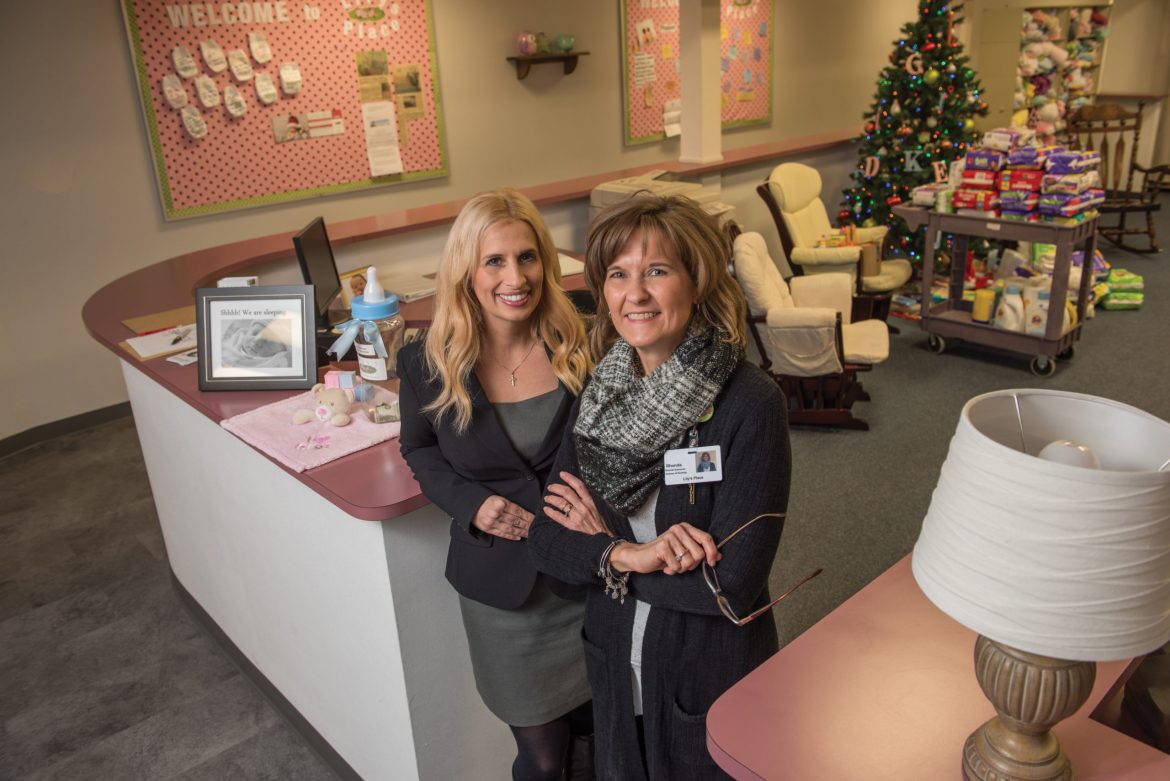Lily’s Place cares for the drug epidemic’s tiniest victims.
By Katherine Pyles
HQ 96 | WINTER 2017
Since Lily’s Place opened its doors in 2014 to care for newborns suffering from Neonatal Abstinence Syndrome (NAS), it has not purchased a single diaper. Support in the form of newborn and size 1 diapers has poured in by the hundreds and thousands from schools, churches, businesses and other organizations throughout the Tri-State.
It’s as if the entire community had been yearning for a way to help these tiniest victims of the drug crisis, Executive Director Rebecca Crowder says.
“One of the worst things to think about is a child who is sick or hurting,” she says. “Yes, these are the smallest victims of drug abuse, but they’re also children in our community who are sick and who are hurting. As adults, I think it’s in our nature to want to help, and I think it’s our responsibility to care.”
Support for Lily’s Place comes in other forms, too, from nurseries decorated by local families to donations of swaddling blankets and sleepers. Even the building itself was a gift from the community – and “nothing short of a miracle,” Director of Nursing Rhonda Edmunds says.
It all started in 2012 in the Neonatal Intensive Care Unit (NICU) at Cabell Huntington Hospital, where Edmunds worked as a nurse with clinical coordinator Sara Murray and volunteer Mary Calhoun Brown. Of the 36 NICU beds, more than half were being occupied consistently by babies with NAS. In addition to occupying beds that could be needed by preterm, critically ill infants, the drug-exposed infants were responding poorly to the high-stress, over-stimulating environment of the NICU.
“We were frustrated and feeling like we weren’t doing any of the babies justice,” Edmunds, who began looking online for a better way to care for babies suffering from prenatal drug exposure, recalls. She found one, and soon she and Murray were boarding a flight to Kent, Washington, to learn more.
During their visit to Kent’s Pediatric Interim Care Center, Edmunds and Murray learned techniques that would help them provide better, more therapeutic care to drug-exposed babies at the hospital. They learned the importance of a dimly lit environment, of walking slowly and of talking softly. They learned new ways to feed, hold and rock the babies that would help alleviate their pain. And they learned that Huntington, West Virginia, could potentially transform the way NAS babies are treated – in the hospital and beyond.
Edmunds and Murray worked with neonatologist Dr. Sean Loudin to create a separate unit in the hospital for drug-exposed babies called the Neonatal Therapeutic Unit (NTU), where the babies would receive medical care and treatment in a more soothing environment. But they wanted to do even more. They wanted to build Lily’s Place.

Brown arranged to have Rep. Evan Jenkins visit the NICU, and he’s provided legislative support for Lily’s Place and drug-exposed babies ever since. Brown also asked a realtor friend to be on the lookout for property. He responded, “I already have a building in mind.”
The address was 1320 7th Ave., a medical office building where the late Dr. Darrel Darby, husband of Laura Darby, practiced podiatry. The realtor had spoken with Laura Darby just days before Brown’s phone call.
“Mrs. Darby had said, ‘I’ve been praying about this property, and I think I need to give it away,’ ” Edmunds remembers. “The first time I came here, I had chill bumps. I was in tears by the time I left. ‘This is from God,’ I thought. ‘It’s nothing short of a miracle.’ ”
Of the three cofounders, Murray and Brown serve on the Lily’s Place Board of Directors, while Edmunds oversees day-to-day operations as nursing director.
Dr. Loudin serves as medical director of both Lily’s Place and the NTU, and Crowder was named executive director of Lily’s Place in 2015. In addition to specially trained nurses and patient care assistants, the Lily’s Place team includes Angela Davis, a social worker trained in trauma-informed care. Doctors from Valley Health oversee the medical treatment of the babies, and volunteers ranging from college students to grandparents rock babies, do laundry, clean and perform odd jobs around the building.
“Everyone here really has a passion for what they’re doing,” Crowder says, adding that many of the nurses and other staff had to take a pay cut to join Lily’s Place. “Taking care of any baby isn’t easy, let alone a baby going through the withdrawal process. We have a great team that is truly dedicated to these little ones.”
Lily’s Place cares for 10-12 babies at a time, Crowder says, but weaning babies off the drugs they were exposed to in the womb is only part of the center’s mission. The Lily’s Place staff travels to day cares, adoption agencies and rural hospitals to educate caregivers on the symptoms of NAS, and a 1,100-page replication plan will help other communities develop their own neonatal withdrawal centers.
“When we go out into the community, it’s not to publicize Lily’s Place,” Crowder says. “It’s to help as many people as possible learn how to care for these babies and recognize the symptoms of withdrawal. This is a need that extends far beyond Huntington.”
Lily’s Place is leading the way for drug-exposed babies throughout the region. It’s saving lives and taxpayer dollars and providing babies with the best start in life possible. However, Edmunds says much remains unknown about the impact of NAS. Some of the first patients of Lily’s Place are now walking, talking and meeting other milestones, but will they develop learning delays later in life? If they require anesthesia for a medical procedure, will they experience adverse effects? If they experiment with drugs or alcohol as a teenager, will they be more likely to become addicted? Surrounded by questions with no easy answers, there’s one thing Lily’s Place can always do: make a difference, one baby at a time.
“At the end of the day, we’ve made a difference in a baby’s life, even if it was just for that one day,” Edmunds says. “Sometimes it’s hard, and I leave here thinking, ‘I’ve just been whooped by a 2-week-old baby.’ But then I see a mom reading a Bible story to her baby in one of the nurseries, or I look at these babies about to go home who’ve gone from being so sick and suffering so badly to being able to smile and laugh out loud, and I think, ‘They’re going to be okay.’ And that’s such a reward.”

At Lily’s Place, providing for the babies means providing support and education for their parents – or, in certain cases, their foster parents, adoptive parents, grandparents or other family members. Custody decisions are made by West Virginia’s child protective services. Crowder says one of her goals for the future is to expand the center’s support services to include full-time recovery coaches and substance abuse counselors. Eventually, she says, she’d like Lily’s Place to house an intensive outpatient program for mothers who want recovery but are afraid of losing their children.
“The bottom line is that we want our babies to succeed,” she says, “and we cannot do that without helping their parents succeed, too. We’ve built wonderful partnerships with local recovery programs, but there just aren’t enough beds for people seeking help. We want to be part of the bigger picture and part of the solution.”
Most babies stay at Lily’s Place for three to four weeks. While they no longer require medication when they are discharged, they do still experience some withdrawal symptoms. Parents and caregivers receive extensive training on therapeutic handling techniques and ways to prevent overstimulation at home, and a training video by Dr. Loudin explains the brain changes that take place with prenatal drug exposure.
“The babies often go home with tremors and stiff tone, and sometimes they’ll have episodes of being inconsolable,” Edmunds says. “Their brain development has been affected, and it will take a while to get them used to life without drugs. We want the parents to know how to deal with that, even if sometimes it means placing the baby in the crib and walking away for a few minutes. We want these parents to leave feeling valued and prepared, not judged. We want to extend grace to them.”
For that, there’s Kevin’s Room, one of the 16 decorated nurseries at Lily’s Place. Decorated by Laura Darby in honor of her grandson, Kevin’s Room contains both a crib and a full-sized bed. Family members are invited to stay the night and receive hands-on training from the Lily’s Place staff before heading home.
When babies leave Lily’s Place, it’s a bittersweet moment for the entire team, Crowder says.
“We walk them to the door, make our last little funny faces at them and watch them pull away,” Crowder says. “For me, when the babies are going home with their biological parents who are now healthy, that’s the happy ending. But there are other happy endings, too. And anytime a baby leaves Lily’s Place for a loving, drug-free home, that’s something to celebrate.”
Lily’s Place is always in need of diapers, baby wipes and sleepers, as well as monetary donations and volunteers. For more information about Lily’s Place and how you can help, visit www.lilysplace.org.




